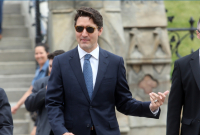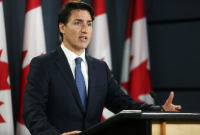Support strong Canadian climate journalism for 2025
U.S. state governors meeting Friday with Prime Minister Justin Trudeau stressed their interest in seeing the North American Free Trade Agreement survive and continue beyond its upcoming renegotiation.
Wisconsin Gov. Scott Walker left his meeting with the prime minister acknowledging the countries' differences over dairy policy, but downplaying the idea that any single irritant could cause the dismantling of the three-country trade pact.
"I don't think you need to blow it up. I think it needs to be improved," Walker told a group of Canadian reporters.
"I think it's (about) improving. I mean, you're talking about something that's more than two decades old. No matter how good something is there's always good ways to improve it. So I think that's positive.
"For the businesses in Wisconsin ... we want to make sure that our largest market in the world is still accessible."
Friday is like a day of Canada-U.S.. political speed-dating: Dozens of American governors, and several Canadian federal and provincial representatives, are holding meetings in quick succession, hoping to leave a good impression before the relationship gets tested by the cold reality of trade negotiations.
They're all converging at a Rhode Island convention centre where about three-dozen U.S. state governors are holding their annual summer meeting, with trade uncertainty looming ahead.
The Canadian side is led by Trudeau: he will deliver a keynote address, participate in a public panel, hold separate meetings with five state governors, and have a formal one-on-one session with Vice-President Mike Pence.
It's all happening with major economic developments potentially days away. Next week, the U.S. is expected to publish its negotiating positions for a new NAFTA, then there's an impending U.S. decision on steel tariffs, a dispute over Bombardier, and negotiations aimed at settling the softwood lumber dispute.
The Republican governor of Kentucky dismissed as absurd the notion that his country might impose trade barriers, like the idea of a border tax being suggested by some people in Washington.
"There's a lot of concern, a lot of talk, a lot of hypotheses about what might happen, as things are renegotiated and things are re-discused," said Gov. Matt Bevin.
"We're each other's strongest trading partner, we're each other's closest ally, literally and figuratively. The idea that it won't come out in good measure for both parties is preposterous. I mean, the idea that it won't be continuing a strong relationship is something, I think, people shouldn't even waste time thinking about. Cross-border taxes don't do anybody any good. Us starting to do tit-for-tat ultimately creates more trouble."
Trudeau's keynote speech to the annual state-governors' conference in Rhode Island is titled: "Collaborating to Create Tomorrow's Global Economy."
Canadian officials say the long-term objective here is to create relationships that could prove useful, should trade talks hit a difficult patch and Canada find itself in need of allies willing to speak up in favour of NAFTA.
The federal government has identified 11 U.S. states that might have the most political clout in upcoming trade debates, with several having been won at least once by Barack Obama, swung to Donald Trump, and exporting heavily to Canada.
The Canadian contingent is poised to hold individual meetings with about half of the three-dozen governors present. That contingent includes Ontario Premier Kathleen Wynne, Quebec's international relations minister, Nova Scotia's transport minister, federal cabinet members, and senators.
"Our conversations here have one focus: free trade, and the renegotiation (of NAFTA)," Quebec minister Christine St-Pierre said in an interview. "It's a real public-relations exercise, one of convincing our partners of the importance of trade."
Trudeau will be meeting the governors of five states — Kentucky, Wisconsin, Rhode Island, Iowa and Colorado. St-Pierre has conversations planned with the governors of four U.S. states and one Mexican state.
The Quebec minister said there's a good level of teamwork between the various delegations from Canada: "There is really, really, really a desire to work closely together on this... We're all on the same page."





Comments